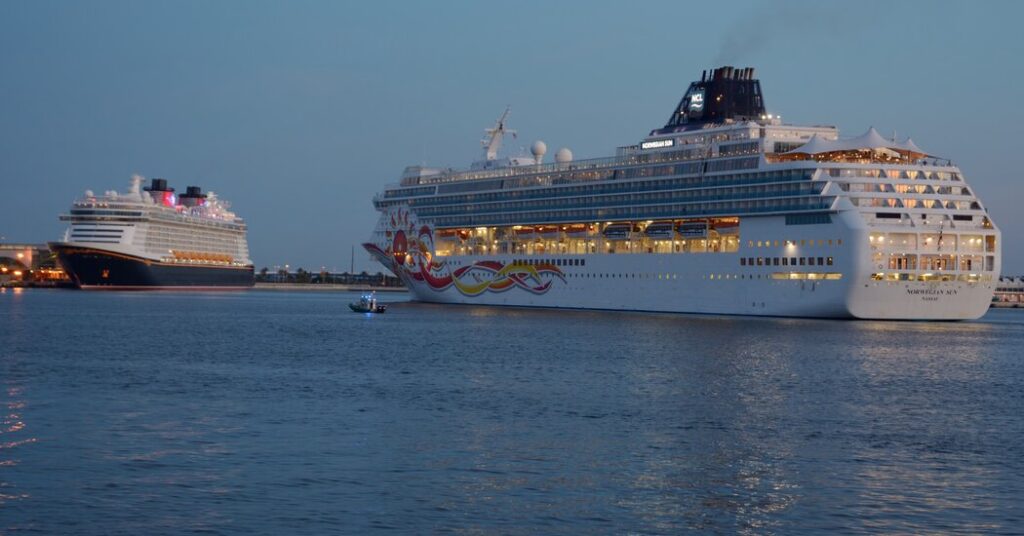Two days into a 12-night Caribbean cruise on the Norwegian Sun, after an evening watching karaoke with her parents, a 20-year-old woman went to the nightclub to meet people her age.
After ordering a drink around 11 p.m., the woman, referred to as Jane Doe in a lawsuit filed against the cruise line in December 2024, said she remembered nothing until the early morning, when she stumbled down the corridors, frantically tapping her key card on door after door until she found the stateroom she shared with her parents.
They heard her come in around 2 a.m. but didn’t fully awaken until someone banged on their door at 5 a.m. Through the peephole, Doe’s father saw two men shouting his daughter’s name. Her mother called security; it was then she saw her daughter on the bed shaking.
“She had a few drinks, but this was another level of intoxication,” her mother, a psychiatric nurse practitioner, recalled, speaking on the condition of anonymity to protect her daughter’s privacy.
When the security officer asked Doe if she knew the men, she started crying and made references to having had sexual activity with them.
It wasn’t until hours later, when she tested positive for an ingredient commonly used in date rape drugs that Doe said she knew she had been sexually assaulted: “I realized what they did to me when I got the drug test results.”
Doe’s experience was one of 120 alleged sexual assaults on cruise ships that were reported to the F.B.I. in 2024, up from 101 in 2019, a year before the pandemic shut down the industry. From January to September this year, 102 cases were reported, compared with 95 for the same period last year. Those figures are likely higher as many cases go unreported, according to the Rape, Abuse & Incest National Network, a U.S.-based anti-sexual-assault organization.
As cruising hits record demand, with 34.6 million passengers last year, crime on ships sailing from the United States has also risen. Among the crimes that ships must report — including thefts of items worth more than $10,000 and physical assault — sexual assault is the most prevalent.
On that December morning, Doe began the difficult process of seeking justice. That process is a challenge on land, according to RAINN. But on a cruise ship, as Doe would learn, it is even more difficult.
A Troubling Trend
Cruises often have a party atmosphere, with large quantities of alcohol consumed, which can contribute to assaults, notes RAINN. Packages with a 15-drink daily limit, an amount defined as “high intensity” drinking by the National Institute on Alcohol Abuse and Alcoholism, are common. (Cruise Lines International Association, the industry group, said that “limits are enforced.”)
In 2010, Congress passed the Cruise Vessel Security and Safety Act, requiring lines sailing in and out of U.S. ports to report certain crimes to the F.B.I., which investigates and publishes accusations. But the database provides only the number of incidents, not how they are handled. The act also established training standards for crime prevention, detection, evidence preservation and medical assistance, and required ships to have video surveillance.
“The cruise industry is one of the most controlled, regulated and monitored in the world,” said Anne Madison, a spokeswoman for CLIA, adding that “serious crime on board cruise ships is extremely rare.” Requirements to report serious crimes do not exist for hotels, theme parks and airlines, she said.
Yet despite the 2010 law, not much has changed in the prevention and prosecution of on-board sexual assaults in the last 15 years.
Even knowing how many allegations led to charges or trials is almost impossible. No agency is charged with tracking that information nationally, and a New York Times request in May to the Department of Justice to compile the data has not been fulfilled.
Through an extensive search of legal and news databases, The Times found just 13 prosecutions and seven convictions from 2015 to 2025.
Ross Klein, a retired professor at Memorial University of Newfoundland who tracks the cruise industry said, “There is no way to reliably know how many cases reach the attention of law enforcement, and how many of those are prosecuted.”
He estimates that there are 30 to 40 civil suits filed against cruise lines for sexual assault in any given year, but most are settled, often with the stipulation that accusers cannot publicly discuss their cases.
Reporting on-board crimes is challenging: Ships fly foreign flags to benefit from lower taxes and looser regulations, and sail across international jurisdictions. Law enforcement is carried out by private security teams whose loyalties often lie with the cruise company that employs them, according to maritime lawyers and former security staff.
Even when victims seek justice through civil lawsuits, the hurdles are formidable.
“It’s not easy for victims to go up against these huge cruise lines,” said Laurie Dishman, 54, a board member of the International Cruise Victims Association, a nonprofit focused on survivors of onboard crimes, and herself the victim of an onboard sexual assault. “It’s a long, hard, traumatic battle.”
The Role of Security Teams
CLIA, the industry group, says cruises are among the “safest vacation options in the world.”
But many Americans do not realize that once a ship leaves a U.S. port, the rights they had on land don’t always apply, partly because the security force is not independent.
Daniel Courtney, a Miami-based personal injury lawyer who represented a woman who recently won a $12 million lawsuit against Carnival Cruise Line after accusing a crew member of rape (Carnival has appealed), said that when passengers complain, the responding security officer often prioritizes the line’s interest. “Security will do whatever it needs to protect the company first,” he said.
A retired British police officer who worked as a security officer for Norwegian and Carnival and spoke anonymously because he consults for another line, said officers often look for expedient ways to make incidents go away.
Security may pressure passengers not to file an F.B.I. complaint, according to legal experts, victims and former security staff. “They will say things like, ‘Are you sure you want to do this? It’s going to be a he said/she said scenario,’” said Michael Winkleman, a Miami-based maritime lawyer. “In my opinion, that is squarely because the guards are cruise line employees who have an inherent bias and interest in protecting the company.”
Though the 2010 cruise act established training standards, only one crew member on each vessel must be trained in crime prevention and evidence gathering. A 2011 online curriculum developed by the U.S. Coast Guard, the F.B.I. and the U.S. Maritime Administration is not mandatory and was found “ineffective in providing qualified first responders with the capability to address shipboard crime, especially sexual crime,” according to a review by maritime-training academies for the cruise victims association. They recommended mandatory training by certified individuals who report directly to the F.B.I., the Coast Guard and other entities.
According to the Jane Doe complaint, Norwegian Sun’s security head “harassed, badgered and pressured Doe,” and told her the complaint would go nowhere unless she could describe the pain of her assault.
Later, the complaint says, he told Doe’s mother he was not trained to communicate with sexual assault victims and had training dealing only with “blood and guts.” After the family insisted, he reported the incident to the F.B.I.
Norwegian did not respond to requests for comment about Doe’s case and the line’s safety measures.
CLIA said it prioritizes passenger safety. “While we recognize that even one incident is too many, our members are required to have comprehensive security measures, protocols and training,” said Ms. Madison, the spokeswoman.
She added that “every ship is protected by security professionals.” Claims that security doesn’t have appropriate training, according to an emailed CLIA statement, “are at odds with the depth and rigor of the training cruise lines employ.”
When asked to allow a reporter to attend training sessions and interview security about sexual-assault training, Royal Caribbean, Carnival and Norwegian declined.
The F.B.I.’s Role
When a crime is reported to the F.B.I., the investigation is often hampered by the ship’s foreign registration and the logistics of getting an agent onto the ship. It can take hours or days to secure a crime scene.
Complicating the situation is the interview process. Getting timely information from a victim is “a balance and a challenge,” said Special Agent Summer Baugh, who specializes in cruise crimes for the F.B.I. Baltimore field office.
In Jane Doe’s case, it wasn’t until the day after the alleged attack that the Norwegian Sun arrived in Puerto Rico, where Doe was interviewed by two male agents, who, she said, did not provide their names or contact information (the F.B.I. said it was unusual not to share such information).
After the agents left a few hours later, the ship’s security told the family that the agency would not investigate further because CCTV footage showed Doe going into the men’s cabin willingly.
“The cruise industry position is that when somebody voluntarily goes into a cabin, the cruise line has no responsibility,” said Jamie Barnett, president of the International Cruise Victims Association, whose daughter died of a methadone overdose on a Carnival cruise in 2005.
When the family asked the security head if the F.B.I. had reviewed blood-test results showing the presence of amphetamines, which are known to be used in date rape and party drugs, and a breathalyzer reading equivalent to about two drinks, he said he couldn’t share investigation information.
Doe’s father tried to follow up with the F.B.I. in San Juan, and was told that the investigation was open and that an agent would be in touch. He never heard back. Nor did Adam Finkel, Doe’s lawyer. (The F.B.I. said that it is sometimes unable to release information in order to protect ongoing investigations.)
How Evidence is Handled
While studying Jane Doe’s case, The Times reviewed dozens of civil lawsuits against cruise lines, including Carnival, Norwegian, Royal Caribbean, MSC and Disney, in which passengers say they were drugged, raped or sexually harassed. Many were minors who had been entrusted to child-care services or were unsupervised.
Court documents and interviews with lawyers, industry experts and former employees reveal a theme of inadequate evidence-gathering: unprocessed rape kits, witnesses who weren’t interviewed, evidence contamination and loss of video footage.
In 2024, a Princess Cruises passenger said she was assaulted by a D.J. who worked in the ship’s nightclub. After reporting the incident, she said a security officer sat on her bed where the alleged assault had occurred, potentially contaminating the scene.
Princess Cruises said it could not comment on pending litigation and reiterated CLIA’s statements about the industry’s strict regulation.
In a case of a minor represented by Mr. Courtney, the victim, identified as Mary Doe, said she was assaulted by a fitness instructor for Bahamas-based OneSpaWorld, which operates onboard spas and fitness centers. Mr. Courtney said that Mary Doe should have been sent to the medical center immediately, but instead was asked to give a statement to male security officers. The ship’s doctor performed a forensic exam hours later.
Carnival initially refused to provide Mary Doe with her records and withheld access to video evidence, according to her legal complaint. She was finally granted access four months after she filed the suit, Mr. Courtney said.
While cruise companies are not obligated to show passengers their records unless the ship’s flag country requires it, most major lines say they will be provided upon request. But in case after case, victims and their lawyers describe the difficulty of obtaining such evidence.
“By delaying the process, they hope that the problem will go away,” Mr. Courtney said.
“We follow the law and standard practices in making evidence available during the pretrial discovery phase,” said Chris Chiames, the chief communication officer for Carnival.
The Push to Settle
Many victims, like Jane Doe, file civil suits when their efforts to pursue justice through the criminal system are thwarted. But the prospect of lengthy court cases involving billion-dollar companies leads many to settle. Those settlements usually include nondisclosure agreements, which keeps on-board assaults out of the public eye.
Jane Doe was among those who took that route.
Ms. Dishman, who said she was raped by a security officer on a Royal Caribbean ship in 2006, is among the few to go public.
After the F.B.I. declined to prosecute her case, she contacted the media and filed a lawsuit under her own name. “I knew the only way to bring about any change was to go public,” she said. She settled with Royal Caribbean in 2008, but did not sign an agreement to stay quiet.
She said that cruise lines are becoming more aggressive about settling, sometimes offering payouts before a suit has been filed, to avoid bad publicity.
Since Ms. Dishman’s case, Royal Caribbean says it has worked to develop best practices for dealing with sexual assault.
Ms. Dishman asked for improvements to safety equipment, but she said the company didn’t engage and just kept offering more money, so she turned to Washington. Her recommendations were eventually included in the 2010 Cruise Vessel Security and Safety Act.
But she and others say the law’s impact has been limited by the lack of independent oversight. While the Coast Guard inspects ships at least once a year to make sure they are complying with the law, critics say that oversight is not enough.
So far, efforts to update the act have gone nowhere in Congress, but in August, legislation was reintroduced, aiming to improve medical care, strengthen safety measures and ensure proper investigations, according to the office of Senator Richard Blumenthal, Democrat of Connecticut, one of the act’s sponsors.
With limited funding, the International Cruise Victims Association says it falls short when it goes up against the cruise industry, which spent nearly $23 million lobbying Congress from 2020 to 2024, according to Washington-based Open Secrets, which tracks political finance.
“We go to Washington regularly,” Ms. Dishman said, “but ultimately, it’s our stories versus the cruise line’s checkbooks.”
Follow New York Times Travel on Instagram and sign up for our Travel Dispatch newsletter to get expert tips on traveling smarter and inspiration for your next vacation. Dreaming up a future getaway or just armchair traveling? Check out our 52 Places to Go in 2025.
Ceylan Yeğinsu is a travel reporter for The Times who frequently writes about the cruise industry and Europe, where she is based.
The post For Victims of Sexual Assault on Cruise Ships, Justice Can Be Elusive appeared first on New York Times.




